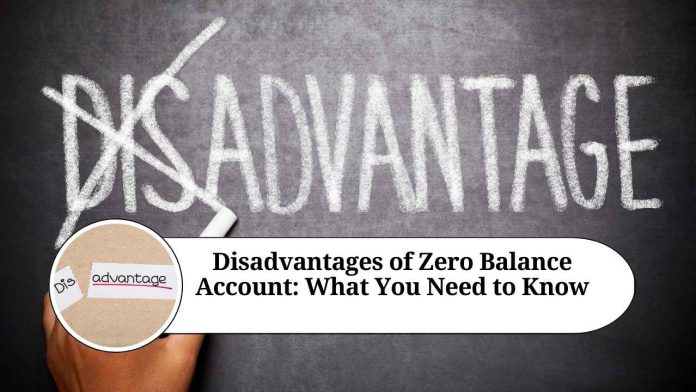Introduction of Disadvantages of Zero Balance Accounting
Zero balance accounts are bank accounts that do not require any minimum balance to be maintained by the account holder. They are designed to provide financial inclusion to people who cannot afford to maintain a minimum balance. While zero balance accounts have their advantages, they also have their disadvantages. In this blog, we will discuss some of the disadvantages of zero balance accounts.
Limited Customer Support:
Another disadvantage of zero balance accounts is limited customer support. Since these accounts are designed for low-income individuals, banks may not provide the same level of customer support as they do for other accounts. This can be a significant drawback for customers who require assistance with their accounts or have questions about their transactions.
Difficulty in Receiving Payments:
Zero balance accounts may make it difficult for customers to receive payments from third parties. For example, if a customer is expecting a payment from an employer or a client, they may need to provide additional documentation to receive the payment in their zero balance account. This requirement can be a significant inconvenience for customers and may discourage them from using these accounts.
Inconvenience for Regular Users:
For customers who frequently use their bank accounts for transactions, a zero balance account can be inconvenient. Since these accounts often have limited features, customers may need to visit a bank branch to perform certain transactions, such as cash withdrawals or fund transfers. This can be time-consuming and may discourage customers from using these accounts.
Higher Risk of Account Closure:
Since zero balance accounts do not require a minimum balance, they may be more susceptible to closure by the bank. If a customer does not perform any transactions or maintain a balance for an extended period, the bank may close the account without notice. This can be a significant disadvantage for customers who may need to use the account in the future.
Conclusion:
While zero balance accounts can be helpful for customers who cannot afford to maintain a minimum balance, they also have their disadvantages. These accounts may have limited features, lower interest rates, higher transaction fees, limited customer support, difficulty in receiving payments, and inconvenience for regular users. Additionally, these accounts may be more susceptible to closure by the bank. Therefore, customers should carefully consider their financial needs before opening a zero balance account and ensure that they have a plan to avoid any potential drawbacks.
Read more useful content:
Frequently Asked Questions (FAQs)
- What is a zero balance account?
A zero balance account is a type of bank account that does not require a minimum balance to be maintained by the account holder.
- What are the benefits of a zero balance account?
The primary benefit of a zero balance account is that it provides financial inclusion to people who cannot afford to maintain a minimum balance. These accounts also have lower fees and charges compared to other savings accounts.
- What are the disadvantages of a zero balance account?
Some of the disadvantages of a zero balance account include limited features, lower interest rates, higher transaction fees, limited customer support, and difficulty in receiving payments.
- What services are available with a zero balance account?
Banks may restrict the services available to zero balance account holders. Some of the services that may be restricted include cheque books, debit cards, and online banking facilities.
- Do zero balance accounts earn interest?
Yes, zero balance accounts earn interest, but the interest rates are typically lower than other savings accounts.
- Can I access credit with a zero balance account?
Having a zero balance account may limit the account holder’s ability to access credit. Banks may require a minimum balance or a history of transactions before they can approve a loan or a credit card application.
- Is it possible to convert a zero balance account into a regular savings account?
Yes, it is possible to convert a zero balance account into a regular savings account by maintaining a minimum balance as per the bank’s requirements.
- How can I close my zero balance account?
To close a zero balance account, the account holder should visit their bank branch and submit a written request to close the account.
- Can I transfer funds from a zero balance account to another account?
Yes, funds can be transferred from a zero balance account to another account by using the bank’s fund transfer facility.
- Are there any restrictions on the number of transactions that can be performed with a zero balance account?
Banks may impose restrictions on the number of transactions that can be performed with a zero balance account. These restrictions may vary depending on the bank’s policies.




















